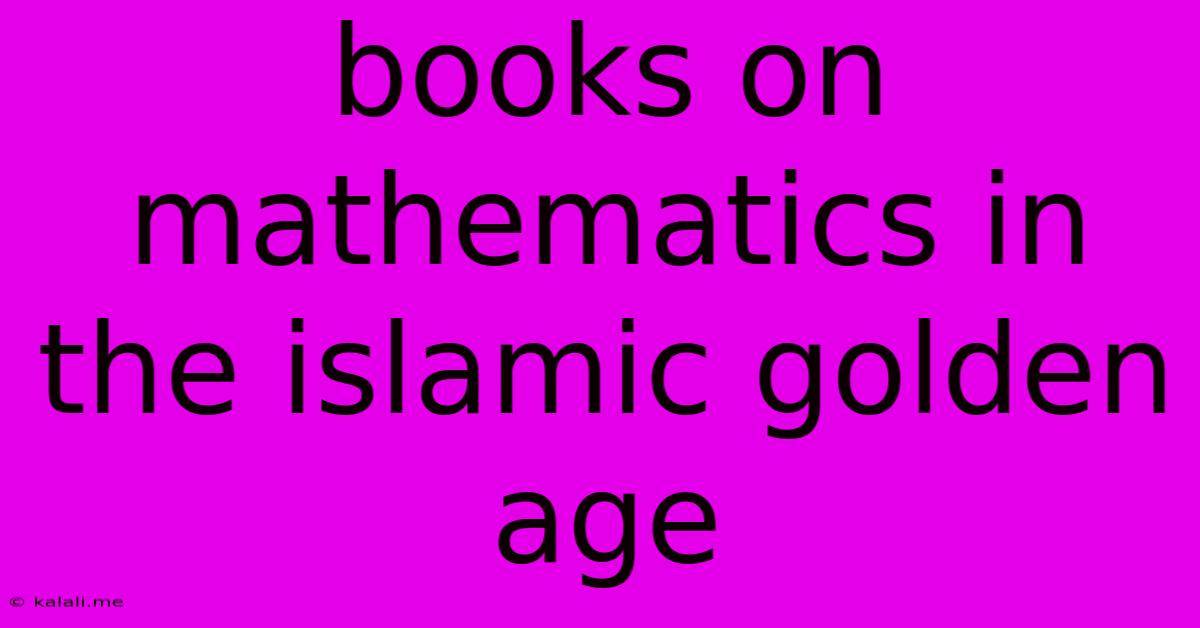Books On Mathematics In The Islamic Golden Age
Kalali
May 24, 2025 · 3 min read

Table of Contents
Exploring the Mathematical Marvels of the Islamic Golden Age: A Guide to Essential Books
The Islamic Golden Age (roughly 8th-13th centuries CE) witnessed an unprecedented flourishing of intellectual pursuits, with mathematics playing a central role. This period saw significant advancements in algebra, geometry, trigonometry, and number theory, impacting the course of mathematical history for centuries to come. While accessing original manuscripts can be challenging, several books delve into the fascinating world of mathematics during this era, offering both scholarly analysis and accessible introductions. This article explores some essential reads for anyone interested in exploring this rich mathematical heritage.
Why Study Mathematics from the Islamic Golden Age?
Understanding the mathematical achievements of this era is crucial for several reasons. Firstly, it corrects the Eurocentric bias often present in historical narratives of mathematics, showcasing the significant contributions of Muslim scholars. Secondly, it reveals the intellectual interconnectedness of different cultures, demonstrating the exchange of ideas across geographical boundaries. Finally, it illuminates the foundations upon which modern mathematics is built, revealing the origins of many concepts and techniques we take for granted today.
Essential Books for Understanding Islamic Golden Age Mathematics:
This list caters to different levels of mathematical expertise, ranging from popular science reads to more scholarly works.
For the General Reader:
-
The Crest of the Peacock: Non-European Roots of Mathematics by George Gheverghese Joseph: This highly accessible book provides a broad overview of non-European mathematical traditions, dedicating a significant portion to the contributions of the Islamic Golden Age. It effectively challenges the traditional narrative of mathematical history and highlights the achievements of scholars like Al-Khwarizmi and Omar Khayyam. This is an excellent starting point for anyone interested in learning about this topic.
-
Numbers and Numerals: A History of Number Systems by John McLeish: While not solely focused on the Islamic Golden Age, this book offers a clear and concise history of number systems, providing essential context for understanding the numerical innovations of the period. The discussion of Arabic numerals and their global impact is particularly relevant.
For the More Advanced Reader:
-
A History of Mathematics by Carl B. Boyer: A comprehensive and detailed history of mathematics, this book dedicates substantial chapters to the achievements of Islamic mathematicians. Boyer’s work is rigorous and scholarly, providing in-depth analysis of key concepts and figures.
-
Islamic Mathematics and Astronomy by Roshdi Rashed: This book provides a more specialized and in-depth analysis of mathematical and astronomical advancements during the Islamic Golden Age. Rashed's expertise in the field ensures a rigorous and accurate portrayal of the complex mathematical developments of the time.
Focusing on Specific Mathematicians:
Several biographies and scholarly works focus on individual mathematicians who made significant contributions during the Golden Age. These offer a deeper understanding of their specific achievements and the broader context of their work. Looking for books focusing on Al-Khwarizmi, Omar Khayyam, or Ibn al-Haytham (Alhazen) will yield valuable results.
Beyond the Books:
Beyond these books, exploring online resources and academic journals can offer a deeper dive into specific mathematical concepts and their historical development. Searching for topics like algebra in the Islamic Golden Age, Arabic numerals, or contributions of Al-Khwarizmi will reveal a wealth of information.
Conclusion:
The mathematical achievements of the Islamic Golden Age represent a pivotal chapter in the history of mathematics. The books listed above offer various entry points for exploring this fascinating period, catering to a range of readers and levels of mathematical expertise. By engaging with these resources, we can gain a deeper appreciation for the rich and diverse history of mathematics and the significant contributions of scholars from across cultures and time periods. This understanding helps create a more complete and accurate picture of mathematical development, challenging biases and celebrating the global nature of human ingenuity.
Latest Posts
Latest Posts
-
Why Does Elliot Stabler Leave Svu
May 24, 2025
-
What Size Wire For 60 Amp
May 24, 2025
-
How Do I Get Chewing Gum Out Of Carpet
May 24, 2025
-
So We Beat On Boats Against The Current
May 24, 2025
-
Hot Water Smells Like Rotten Eggs
May 24, 2025
Related Post
Thank you for visiting our website which covers about Books On Mathematics In The Islamic Golden Age . We hope the information provided has been useful to you. Feel free to contact us if you have any questions or need further assistance. See you next time and don't miss to bookmark.